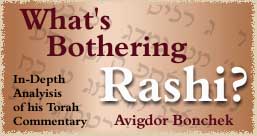

Back to this week's parsha | Previous Issues
Parashas Bamidbar
The Book of Bamidbar (Numbers) begins with G-d's command to Moses to take the count of the Children of Israel. Each of the Twelve Tribes had a leader - Prince - who would be in charge of the census of his tribe. After the names of these princes are enumerated, we find the following sentence. Numbers 1:17. And Moses ands Aaron took these men who were designated by name. RASHI
"These men": Rashi: These twelve princes . This Rashi comment has puzzled all the commentators. What has he added, they ask, to our understanding by his comment? What he says, we already know from the verse itself. Certainly Rashi wouldn't waste ink to repeat in his own words what the Torah itself tells us. Can you think of an answer that explains the necessity of this comment? Your Answer: If you don't have an answer yet, let me show you what some of the major commentators suggest as the reason for Rashi's comment. The Mizrachi (the most famous of Rashi commentators) says: The verse ordinarily should have used a pronoun and said "And Moses and Aaron took THEM ..." But since it went out of its way to elaborate and say "these men who were designated by name" we might have mistakenly thought that these were some other men than those mentioned in the previous list. Therefore Rashi comes to set us straight; he tells us that in fact these are the very same men referred to above.
But this answer is problematic. Why would you say it is problematic? The Problem Answer: First of all, maybe they are different men! How does Rashi know they are not? Rashi's sole source of information are the words of the Torah unless he cites a midrash. Here he doesn't cite a midrash, so he knows what he knows from the Torah itself. How does he know that these are not different men? And if we insist that they are the same men, then why did the Torah use all these extra words?! They actually tell us nothing more than the single word "them" would have told us. This question seriously weakens the validity of the Mizrachi's answer. The Gur Aryeh (this is the Maharal of Prague) offers his answer: The words "these men" makes them sound like ordinary men. But they were of a higher stature, they were princes. Therefore Rashi changes the wording by saying "these twelve PRINCES." But there're are problems with this answer as well. What? The Problems
Some Problems: Again we ask: So why did the Torah refer them as "men" and not as princes, as the Maharal thinks they should be called? It wouldn't be wise to think that Rashi was smarter than the Torah itself! Another early commentator, the Mesiach Illmim, offers the following strange answer: Since the names of the princes include the father's name, like Nachshon son of Aminadav, I might have thought these are two different people (Nachshon AND Aminadav ) and that there were in fact 24 (!) men. Therefore, Rashi's comment is meant to straighten us out by saying "these TWELVE princes." The Problem The problem here should be obvious: No one would ever make such a mistake. Therefore Rashi does not need to tell us there are only 12 and not 24 men here, I understand that on my own.
Why then does Rashi make this comment? This is a real brainteaser.
Do you want a hint? Think about it for a week. If you have an answer, please let me know. I will suggest an answer next week, IY"H.
Back to this week's parsha | Previous Issues
|